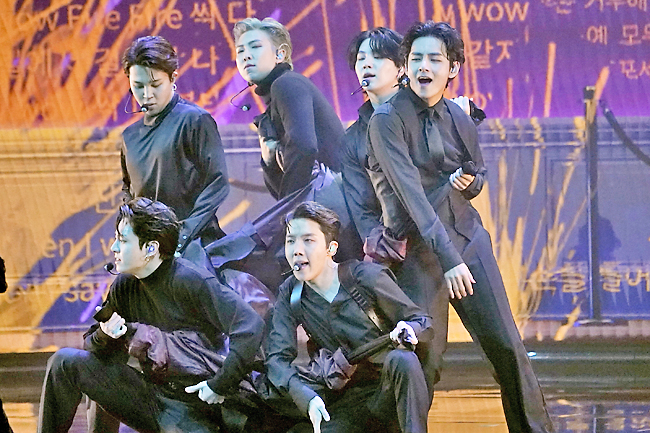SEOUL, SOUTH KOREA (AP) – The surprise announcement by BTS (AP, pic below) last week that they were taking a break to focus on members’ solo projects stunned their global fanbase, shaking their label’s stock price and leaving many questions about the K-pop supergroup’s future.
HYBE, the company behind the band, denied the group was taking a hiatus – a word used in a translation of the group’s video announcement. In the days since, band members remained active on social media, continuing the stream of posts, photos and assurances that the band wasn’t breaking up.
Despite the immediate impacts – HYBE’s stock initially dropped over 25 per cent and has yet to fully recover – several factors may still affect BTS’ future. One is looming military enlistment, as well as how engaged the group and their fans will continue to be in social issues.
In 2020, the South Korean government revised the country’s military law that requires able-bodied South Korean men to perform approximately two years of military service.
The revised law allows top K-pop stars to defer their military service until they turn 30 if they’ve received government medals for heightening the country’s cultural reputation and apply for the postponement. BTS members meet the criteria as recipients of government medals in 2018. There have been calls – including from South Korea’s former culture minister – for an exemption for BTS because of their contribution to heightening South Korea’s international reputation.

But critics said that such an exemption would be bending the conscription rules to favour the privileged. Military enlistment has always been a headache for HYBE; BTS once accounted for 90 per cent of the label’s profit. Currently, the group makes up 50 to 60 per cent according to a report from eBest Investment and Securities.
The eBest report noted that the rapid stock plunge might have resulted from an “anticipation that the activities as the whole group might be uncertain after being discharged from the military”.
HYBE has been attempting to diversify its portfolio by debuting new K-pop bands, making online games, and rolling out Korean language tutorials.
As the most successful K-pop band to date, BTS has for years commanded tremendous attention on social media and with each new music release.
“Once you achieve success like BTS achieved success, then it means there’s a constant expectation to continue doing something that is connected to what you’ve already done, where you’ve already been. In the most recent releases that BTS brought out, also we can see how they continually reflect back on where they have been,” professor of Korean and East Asian Studies at Pusan National University CedarBough Saeji said.
She said the announcement signalled the band’s intention to figure out “where they are going for themselves without interference from other people” and “being able to choose their own path forward as artistes”.
The announcement also leaves in doubt the group’s social justice efforts, which included vocal support for the Black Lives Matter movement and anti-violence campaigns.
But the group faced mushrooming questions about why it isn’t as vocal about discrimination in their own country.
A leading South Korean newspaper recently published a column in which the author mused why South Korea, despite having BTS – “the ambassador of anti-discrimination and human rights” – struggled to enact an anti-discrimination law for 15 years. “It’s an irony,” the writer said. “South Korea needs their force for good.”
The country’s lack of an anti-discrimination law led to unfair treatment against women and foreigners, among others.
Why Anti-Discrimination Law? author Jumin Lee told the Associated Press that there’s a dire need for the anti-discrimination law in the country. “South Korea is in essentially the same situation legally as the US’ Jim Crow South. Equal protection exists as a constitutional concept, but there is no implementing legislation that allows the government to force private businesses to comply,” Lee said.
Lee recently expressed disappointment in the band for not speaking up about the important domestic issue. “BTS and their business folks know that speaking up in the US is profitable but doing the same back home would be more trouble than it’s worth,” tweeted Lee after the band’s visit to Washington.
Despite that, Lee said the band’s silence is understandable, stating that BTS would be met with “indifference at best and hostility at worst” from politicians if they did speak up.
“Although many idols might be politically conscious, they might choose not to discuss social issues,” scholar of Korean pop culture Areum Jeong said.
Several BTS members said during last week’s announcement that they were struggling with the group’s successes and having trouble writing new songs.
“For me, it was like the group BTS was within my grasp until On and Dynamite, but after Butter and Permission to Dance, I didn’t know what kind of group we were anymore,” member RM said.





